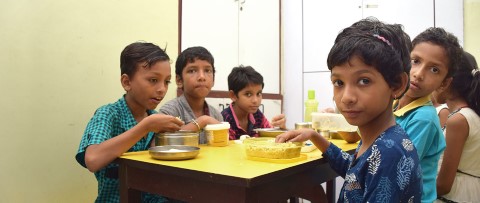- Thought Leadership

Missed part 1? Read now
When 9-year-old Yarisol in Colombia was identified as underweight, she was promptly enrolled in Children International’s nutrition rehabilitation program. Children up to age 12 who are moderately or severely undernourished are targeted and treated for a minimum of two months or until they have regained normal weight.
Often, children are given things like supplements to boost weight gain, but these methods only provide short-term solution. Long-term health won’t improve unless the entire family makes permanent changes to the way they plan and prepare their meals.
That’s why one of the core tenets of the nutrition rehabilitation program is education, so parents and caregivers like Yarisol and her grandmother can learn how to make better choices when preparing their children’s meals.
Debatri Das, a staff member in Kolkata, India, stresses the importance of involving the whole family in a child’s recovery.
The engagement of parents and caregivers ensures a more successful outcome, not just for the child but for all family members.


Patricia Noyi, a nurse at the George community center in Zambia, explains, “We conduct activities like cooking demonstrations. You enroll the mothers and train them on how they can prepare low cost foods. We mostly emphasize utilizing foods that are locally available.” This education is complemented by training on good hygiene, such as proper handwashing, to help families avoid illnesses like intestinal parasitic infections that can contribute to malnourishment.
Catherine, a mother who has attended sessions at the George center, is thankful for the education that is helping her prepare better meals for her underweight son, Osteen. “I have learned how to cook and prepare foods for my child so that he can eat well and live a healthy life,” she says. “I have changed the way I cook to match the way food is prepared at the center. Previously I was cooking chicken by frying but now I learned that I can also boil the chicken.”
The combination of supplements and education has been very beneficial for Yarisol — and she now proudly shops with her grandmother for healthy foods. “I feel better. I have gained weight. I have the desire to eat. I want to play. Now I learn many things at school.”

Her grateful grandmother agrees.
While battling undernutrition, low- and middle-income countries also face what the World Health Organization calls a “double burden” as childhood obesity continues to grow. WHO reports that in 2016, over 340 million children and adolescents aged 5 to 19 were overweight or obese.
Children International operates an obesity program in Mexico and Ecuador, which offers weight management, nutrition counseling and opportunities for increased physical activity. The goal is to provide education that encourages healthy lifestyle choices for children and families. We offer a similar obesity prevention program in Little Rock, Arkansas.
35% |
of participants decreased high BMI scores |
20% |
more parents reported that they are creating a healthy environment at home |
 |
increase in the consumption of fruits and vegetables |
Comments
ElizabethAngulo
Dec 27, 2019
Muy interasnte todo lo que expresan acerca de la nutricion pero no veo o leo lo que reallmente hacen por ejemplo en B/quilla Colombia para ayudar a las familias de los ninos de CI, que meriendas, o almuerzos ofrecen a los ninos. Cuando, como reunen a las madres para instruirlas al respecto?? Gracias por todo lo que hacen a los 'padrinos' nos gustaria tener mas datos especificos de cada region donde uds estan presentes.Gracias otra vez.
You must be logged in to comment. If you have an account, click here to log in.